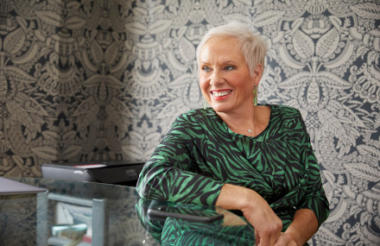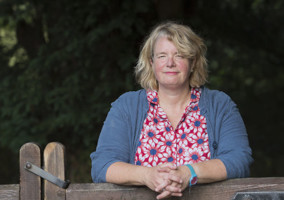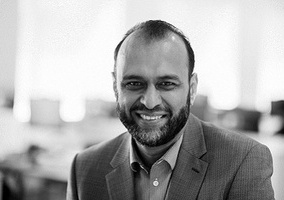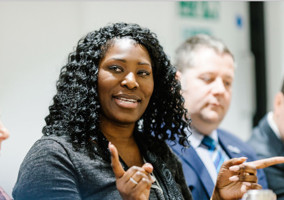“When I got offered the role I screamed and said yes - I didn't even have to think about it,” Leonard Cheshire’s new chief executive says.
Ruth Owen became chief executive of the disability charity in February of this year, having been chief executive at Whizz-Kidz since 2004.
“What made it even more special was my mother was in the nursing staff in Leonard Cheshire,” Owen says, “so through our family life Leonard Cheshire has always been really important.”
Owen is one of five, and says her mother has been “such a strong influence” that “one of us was going to end up carrying on her mantle”.
Her priorities at Leonard Cheshire will be around how to level up post-pandemic and enable disabled people to speak on issues important to them.
Taking the chief executive position was “a no brainier” and “a privilege”. Owen describes it as “a dream job” and an opportunity to “do something really transformational with the organisation” in terms of ensuring Leonard Cheshire “is led by disabled people and fighting for a fair and equitable world”.
‘We spent a stack of money on PPE’
Owen thinks “the charity's done an amazing job through the pandemic” but concedes that “it's been tough”.
Leonard Cheshire spent “a stack of money” on PPE and that will continue as the priority is “always to the safety of our colleagues and the safety of our residents and the people that use our services”.
PPE spend in 2020 to 2021 was in excess of £6m, 20 times more than pre-pandemic levels. While UK government provided some funding to help services, the charity was spending around £240,000 per month more than it received on PPE and other Covid-19 related costs.
“We did an emergency appeal around PPE as well, which was well responded to,” she says. The charity raised approximately £900,000 including gift in kind donations.
Although “the challenge around PPE is difficult” Owen is pleased to see funding is available for Leonard Cheshire to apply for, and she will be prioritising “flexible funding”.
On a related point, she thinks the charity has “done well in our fundraising, but we could do more”. This would be around looking at different ways of funding.
“I think it would be fair to say Leonard Cheshire is not necessarily known as a fundraising organisation,” Owen says. The charity is more “about engagement, engagement of our supporters and the wider community”.
Owen praises the “commitment and dedication” from staff over the pandemic, and says as a result of the pandemic she expects that “there's a little bit of fatigue”.
Last year the charity had around 5,000 staff and the headcount remains about the same in 2021.
For Owen, a key question is around lessons from the pandemic as we emerge from lockdown.
“The biggest challenge we've got is to build out from the pandemic. We’ve got the level up agenda, we've got social care reform around the corner, and we've got the Disability Strategy being published soon from the government - so there are some big things that we have got a voice on,” she explains.
Leonard Cheshire must find our voice
Owen also says the Leonard Cheshire needs “to find our voice”.
On coming to the role, she suggests many people did not know Leonard Cheshire, “if you talk to the under 25’s they definitely didn't know who we were and what we were”.
She admits she “didn't realise” some of the work the charity do internationally, “and I was in the sector”. So “a big challenge is getting our voice out there”.
She will be also on listening to voices from the disabled community and focusing “on how we level up post-pandemic”.
Under her leadership, the charity will look at how to build on the lessons that have come from the pandemic.
“This has to be the moment for disabled people in diversity,” she says.
“For disabled people what would be exciting looking forward is that we learn everything good from the pandemic, and we really do build an environment that includes disabled people at the outset, rather than it being something that's tacked on at the side.”
Owen adds: “I think disability has kind of slipped down the agenda a little bit, and it needs to be higher up the agenda.”
Amplifying voices
As Leonard Cheshire is a pan-disability charity with a global reach it, in her view, has a big role to play in having a louder voice in that space.
For Owen, it is an “exciting” time as the organisation is working on enabling the people that it serves to have a greater voice in defining this future.
“What we're going to do for the future is have a stronger customer voice - a really strong voice from the disabled community,” she says.
This means “leading on the things that are important to them, not what Leonard Cheshire think is important, what they think is important”.
To make their voice heard, Owen says: “I think we need to represent the communities we serve”.
Part of this will include the organisation “celebrating the amazing work that we do with disabled people”. She adds: “I think it's really to be with a disabled person it's not for them. We are the enabler. That's what we are, we're just the person that enables a disabled person to live the life they want to lead.”
“It's about really celebrating a disabled person's achievements, and we're all different to what we achieve, and it doesn't matter,” she says.
This focus means that one of her “number one priorities” will also be employing more disabled people and making Leonard Cheshire “a place that disabled people want to come and work at”.
“We have to represent all the communities that we serve and we have to do that at all levels within our organisation,” she explains.
Owen adds: “I can't go saying to other people and other organisations 'look you need to employ more disabled people', we have to do more and better ourselves. And so that's one of my number one priorities and it's already started.”
‘If you don't know how to approach the subject you just have to ask nicely’
Leonard Cheshire’s chief executive looks forward to a time when having disabled people in leadership positions is the norm.
She says: “It will be great when people like me with a disability are not an exception in doing a leadership role or any role within an organisation, and it's not a discussion point, it's just mainstream, nobody blinks an eyelid at it. I think the day disability is just a conversation, and it's mainstream, I've done my job. And I think we've done our job.”
Owen says in the past “people pigeonholed me in that 'poor me' way, and I thought, 'there's nothing poor about me'. I'm different. I celebrate being different. I want the same as you.”
Owen thinks people can be worried to have conversations around disability.
She says “words can hurt” and it is about “finding the right language”.
Nonetheless, she advises: “If you don't know how to approach the subject you just have to ask nicely.” She adds: “I think societal change happens with the young generation about changing perceptions.”
“I think it is hard to bring those conversations up but all you have to do is ask. The disabled person you are speaking to will tell you the best way,” she says.
‘I want Leonard Cheshire to thrive and be relevant for the future’
Owen says her team and board have had “a number of deep dives” and are currently in the process of “pulling together our strategy” with the hope that it will be signed off in September.
A large part of this strategy will be to engage the younger generation. This will also incorporate Owen's ambition that the charity listens to and is led by disabled people.
Owen says that the fights she had as a young disabled woman “are still the fights that many disabled people have today”.
She feels developments have not been made fast enough. “It frustrates me that the world for disabled people hasn't moved on enough. It's annoying. When I listen to young people today, and they're still having the same challenges that I had, really nothing's moved very quickly.”
Owen adds: “I faced discrimination, I faced many people saying to me ‘you're a lame duck, why do you think you want to go to employment?’. That's still the same for many disabled people.”
Finally, learning lessons from the pandemic will be crucial to creating a more equitable future. For example, working from home has been a welcome development for some people.
This conversation “will be the driver” for Leonard Cheshire and Owen says: “I will stay true to my heart on that because I remember how I felt when I was 18, 19, 20.”
“I want Leonard Cheshire to thrive and be relevant for the future,” she explains.
Related articles
Beccy Speight: There are lessons from RSPB’s ‘utterly determined’ founders
RSPB’s chief executive, Beccy Speight, tells Kirsty Weakley what today's leaders can learn from her charity’s founders and their first big campaign win
Javed Khan: ‘Demand has risen, resources have fallen - that perfect storm worries me’
Javed Khan, chief executive of Barnardo’s, talks about the financial drop his charity is facing, the increase in those needing support, the 'charity halo', and his hopes for the sector.
Ndidi Okezie: 'Covid-19 has shone a spotlight on inequalities that charities have been trying to bang the drum on'
Ndidi Okezie, chief executive of UK Youth, speaks to Harriet Whitehead about her goals for the charity, the #YoungAndBlack campaign, and the importance of collaboration













